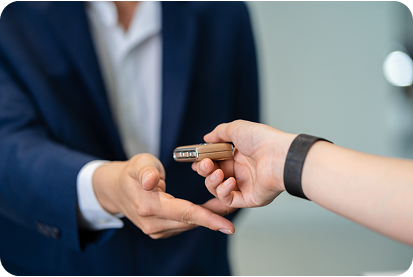10 Tips to Negotiate the Best Deal on a New Car
Buying a new car is exciting, but let's be honest, it can also feel like a high-stakes game of poker. Between confusing pricing, pushy sales tactics, and unexpected fees, it's easy to feel overwhelmed or end up overpaying. That's where a little preparation can save you thousands. In this guide, we'll walk you through 10 smart tips to help you negotiate the best deal possible. Whether you're just starting your research or ready to hit the dealership, these strategies will help you stay in control, avoid common traps, and get the car you want at a fair price.

Get Your AutoQuote
1. Start With Solid Research
Before you step on a car lot, know exactly what the car is worth. Use trusted sites like Kelley Blue Book and AutoQuote to check the MSRP (sticker price) and the invoice price (what the dealer likely paid).
When you know both numbers, you can spot when a dealer is offering a good deal or trying to pad their profits. You'll walk in more confidently, which often changes how you're treated too.
2. Get Pre-Approved for Financing
A pre-approved loan from your bank or credit union gives you two big advantages. First, it helps you understand what you can afford. Second, it gives you negotiating power by showing the dealer you're a serious buyer.
Dealers will still try to offer you their own financing, but now you can compare rates and avoid bad terms. According to Investopedia, buyers who walk in with financing in hand are more likely to leave with a better deal.
3. Focus on the Total Price, Not Monthly Payments
Salespeople love to talk in monthly payments. But when they do that, it's easy to lose track of how much you're paying in total. They can stretch out the loan or sneak in extras that make the payment seem affordable but cost you more overtime.
Instead, always negotiate the out-the-door price. That includes taxes, title, fees, and any extras. Once you've locked that in, then you can figure out what financing terms work best for your budget.
4. Separate the Trade-In From the Purchase
If you're trading in your old car, don't talk about it until you've agreed on the purchase price of the new one. Dealers often mix the two together to make it harder for you to tell what you're paying or getting.
Negotiate each part on its own. Get an online offer for your trade-in through Carvana or CarMax first so you have a baseline. Then you'll know if the dealer's offer is fair.
5. Ask About Older Inventory
Dealers don't like to keep cars on their lot for long. The longer a car sits, the more eager they'll be to move it. If you're flexible on color or trim, ask about models that have been in stock for a while.
Sites like SuperDispatch report that long-sitting cars often come with more room for negotiation. Look for vehicles that have been on the lot for 60+ days and politely ask, “What's your best deal on this one?”

6. Be Specific When You Ask for a Price
on't ask vague questions like “What's your best price?” Instead, show you've done your homework. Mention specific model names, stock numbers, or even other quotes you've received.
Let's say you've used AutoQuote to get local pricing on a 2025 Toyota Camry Hybrid. If you tell the dealer, you've already seen offers in your area for $29,500 and ask if they can match or beat it, they'll know you're not just browsing.
7. Time Your Purchase Wisely
Believe it or not, when you buy it matters almost as much as what you buy. The end of the month, end of the quarter, and especially end of the year are when dealerships are trying to hit sales targets. That's when they're more motivated to make deals.
Shopping on a Monday can also help. Dealerships tend to be quieter, and sales staff may be more focused and flexible than during the weekend rush. According to The Week, the best month to buy is December, especially right after Christmas when inventory must be cleared before the new year.
8. Use Multiple Quotes to Your Advantage
Salespeople love to talk in monthly payments. But when they do that, it's easy to lose track of how much you're paying in total. They can stretch out the loan or sneak in extras that make the payment seem affordable but cost you more overtime.
Instead, always negotiate the out-the-door price. That includes taxes, title, fees, and any extras. Once you've locked that in, then you can figure out what financing terms work best for your budget.
9. Watch Out for Add-Ons
If you're trading in your old car, don't talk about it until you've agreed on the purchase price of the new one. Dealers often mix the two together to make it harder for you to tell what you're paying or getting.
Negotiate each part on its own. Get an online offer for your trade-in through Carvana or CarMax first so you have a baseline. Then you'll know if the dealer's offer is fair.
10. Ask About Demo or Loaner Vehicles
Here's a lesser-known tip. Many dealerships sell former demo cars (used by staff or test drives) or loaners (used by customers during service). These cars are technically new but may have a few thousand miles on them—and they're often discounted heavily.
According to The Sun, buyers have saved $5,000 to $8,000 just by asking if demo models are available.
Putting It All Together With AutoQuote
Let's say you're shopping for a 2025 Honda Accord. Here's how you use everything above to your advantage:
Final Thoughts
Negotiating a car deal doesn't have to be intimidating. When you come in prepared, confident, and informed, the power shifts in your favor. Use tools like AutoQuote to gather real local pricing, be firm but respectful in negotiations, and don't be afraid to walk away if the numbers don't add up. The best deal isn't just about the lowest price, it's about getting the car you want with terms you're happy with. Stay sharp, drive smart, and enjoy the ride.
